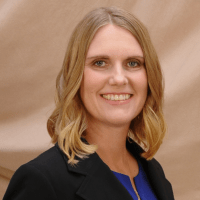
Louise Rasmussen is a principal scientist at Global Cognition. Rasmussen is fascinated by the creative ways people interact with their environments and with others to accomplish tasks and to become smarter. She continues to investigate this broad topic in a variety of domains.
One line of Rasmussen’s research has looked at how people overcome obstacles when they interact with technology. Computers and displays that do not present information in the ways we expect can be real hurdles to finding and making sense of the information we need to accomplish a task. In grad school Rasmussen designed a study that showed how two people collaborating on a task can use communication to make up for the deficits of a poor display. In her current work, Rasmussen enjoys discovering ways to represent complex ideas in graphics and writing that make them easier to digest.
Rasmussen is also interested in the ways people interact with others who think and decide differently than they do themselves. After graduate school Rasmussen oversaw a laboratory study that took a look at ways to improve multinational teamwork. This study showed that multinational teams perform worse when they are exposed to ice-breakers that make members more aware of cultural differences. In a study of US and UK military planners she showed that there are differences in their understanding of what a good plan should look like; differences that could potentially lead to difficulties planning jointly.
In recent study Rasmussen looked at how people become successful in intercultural contexts. To do so, she interviewed a group of well-traveled military professionals. She outlined the informal strategies they use to develop the cultural expertise they need for their unique tasks.
Rasmussen finds it rewarding to contribute to our understanding of how people manage their own learning in domains where the necessary knowledge and skills have not been formally specified yet. At Global Cognition, Rasmussen enjoys being involved in developing training to teach people general strategies for learning and to help them better understand how they and those around them think.
Louise Rasmussen has managed a number of projects funded by government agencies to study these issues. She has published on them in outlets that reach both scientists and practitioners. Rasmussen earned her Ph.D. in Human Factors Psychology from Wright State University in 2007. Dr. Rasmussen is a citizen of Denmark.
Selected Publications
Rasmussen, L. J., & Sieck, W. R. (2012). Metacognitive underpinnings of 3C development. In D. Schmorrow & D. Nicholson (Eds.), Advances in Design for Cross-Cultural Activities 1(pp. 332-341), Boca Raton: CRC Press / Taylor & Francis, Ltd.
Rasmussen, L. J., & Sieck, W. R. (2012). Strategies for developing and practicing cross-cultural expertise in the military. Military Review, Mar-Apr, 71-80.
Rasmussen, L. J., & Sieck, W. R. (2010). What happens after the 3rdcup of tea? A cultural sensemaking guide to Afghanistan. Washington, DC: GPO.
Rasmussen, L. J., Sieck, W. R., & Osland, J. (2010). Using cultural models of decision making to assess and develop cultural sensemaking competence. In D. Schmorrow & D. Nicholson (Eds.), Advances in Cross-Cultural Decision Making, Boca Raton: CRC Press / Taylor & Francis, Ltd.
Rasmussen, L. J., Sieck, W. R., & Smart, P. (2009). What is a good plan? Cultural variations in expert planners’ concepts of plan quality. Journal of Cognitive Engineering & Decision Making, 3, 228-249.
